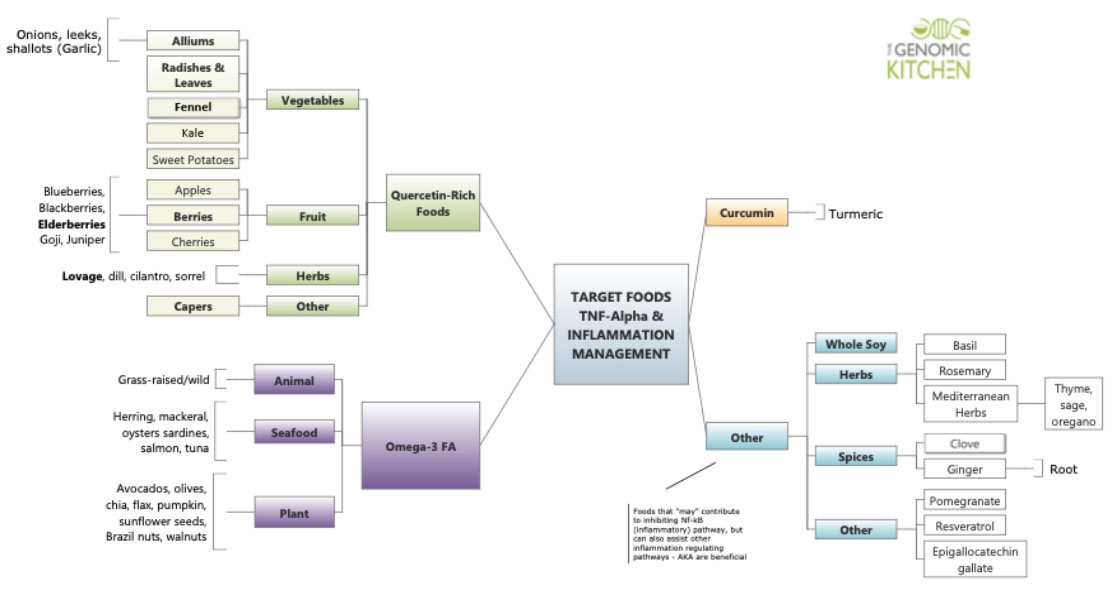Is Sixty the New Forty?
Welcome to the Era of Personalized Nutrition!
We all want to stay young forever ….
Nutrition and lifestyle choices can have a profound impact on the aging process. There is SO MUCH fascinating research coming to the forefront in the areas of Longevity, Genomics and Nutrigenomics.
It’s not just about your genes!

I am passionate about this area of health and beyond excited to share!!
Longevity and aging are two sides of the same coin, as they both derive from the interaction between genetic and environmental factors. Aging is a complex, dynamic biological process characterized by continuous remodeling. One of the most recent theories on aging focuses on immune response, and takes into consideration the activation of subclinical, chronic low-grade inflammation which occurs with aging, named “inflammaging“.1 Long-lived people, especially centenarians, seem to cope with chronic subclinical inflammation through an anti-inflammatory response, called “anti-inflammaging“. 2
Adverse changes in the digestive tract or gut may also contribute to inflammaging, suggesting that the gut microbiota may be an essential target for interventions designed to support healthy aging.
Clearly, the phenomenon of aging is an extremely complex process. While scientists are still sorting out all the intricacies of aging, what we know for sure is that diet and lifestyle have significant effects on how well you age. Nutrition is a powerful tool for supporting graceful aging and longevity.
Let’s discuss some evidence-based nutrition strategies that can help you age with health, vitality, and grace…
1. Incorporate a nutrient dense, anti-inflammatory diet by building health around a healthy plate.
- Non-starchy vegetables: Aim for 4-5 servings per day of non-starchy vegetables such as leafy greens, broccoli, cauliflower, brussels sprouts, kale, bell peppers, asparagus, green beans, and artichokes.
- Starchy tubers and whole fruit: Starchy tubers, such as sweet potatoes and carrots, and whole fruit such as berries, kiwi and pomegranates which are low glycemic and nutrient-dense sources of carbohydrates. These feed beneficial gut bacteria without triggering massive fluctuations in blood sugar and insulin release.
- Increase plant protein and incorporate some animal protein as per individual: Grass-fed beef, organic poultry and eggs and wild-caught seafood are highly bioavailable sources of protein and other nutrients that our bodies need to age gracefully, such as omega-3 fatty acids EPA and DHA and Vitamin B12. As protein sources and portion size is still a gray area, I always recommend personalized nutrition plans.
- Healthy fats: Such as extra virgin olive oil (EVOO), organic unrefined coconut oil, avocado oil and avocados, fresh nuts and seeds, and wild-caught seafood are anti-inflammatory additions to your healthy plate.
2. Optimize blood sugar
As a key hormone INSULIN has a direct impact on signaling and major inflammatory pathways such as MTor, IGF- 1 and AMPK signaling.
There are many nutritional strategies to reduce insulin and carb content such as removing processed foods and high glycemic carbs and introducing nutrient dense carbs (fruits and vegetables) and exploring my healthy carb swaps.
3. Support your gut health and microbiome
Science suggests that changes in the microbiome contribute to inflammaging and the overall aging process. Nutritional support for the microbiome include probiotic-rich fermented foods and prebiotic foods such as garlic, onions, Jerusalem artichokes, asparagus, apples, kimchi, kefir and others. These choices may boosts anti-inflammatory gut bacteria. I often recommend to start with gradual changes due to the increase in fibre content and as tolerated by the individual.
4. Consider Intermittent Fasting and Time Restricted Eating (TRE)
There are many different approaches and strategies to fasting showing great promise. While the research is still ongoing, it has been found that IF can improve metabolic health such as type 2 diabetes, weight loss and other chronic health conditions which are key predictors of healthy aging.
Please see below the Power of Food and some research related to Target Foods and Inflammation Management. As previously mentioned, the era of personalized nutrition is here to stay and can have such an enormous impact when implemented properly.
For more information please contact me.
Click on image below to enlarge.
References:
1 Inflammaging (inflammation + aging) refers to the chronic, low-level inflammation characteristic of aging
2 Inflammaging and Anti-Inflammaging: The Role of Cytokines in Extreme Longevity.
Minciullo PL, Catalano A, Mandraffino G, Casciaro M, Crucitti A, Maltese G, Morabito N, Lasco A, Gangemi S, Basile G. Arch Immunol Ther Exp (Warsz). 2016 Apr;64(2):111-26. doi: 10.1007/s00005-015-0377-3. Epub 2015 Dec 12.PMID: 26658771 Review.
Image: https://www.genomickitchen.com/
Marsha Fenwick, C.N.P. R.R.T.
Marsha is not your typical nutritionist. She began her career 20 years ago as a Registered Respiratory Therapist. Later, she earned her certifications as a Registered Nutritional Consultant Practitioner, Certified Nutritional Practitioner, and Registered Orthomolecular Health Practitioner. Marsha is also a Certified Cancer Coach. Her clinical practice specializes in: sustainable healthy weight loss, digestive health, women's hormones, diabetes, heart health, and cancer prevention and recovery. For more information and to book a FREE 15 minute consultation go to www.marshafenwicknutrition.com








